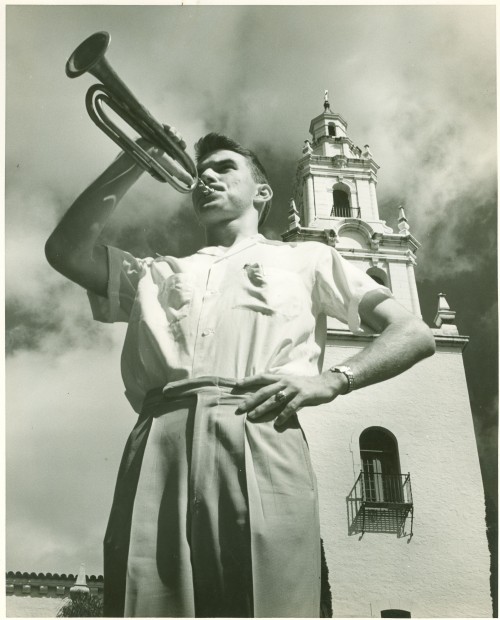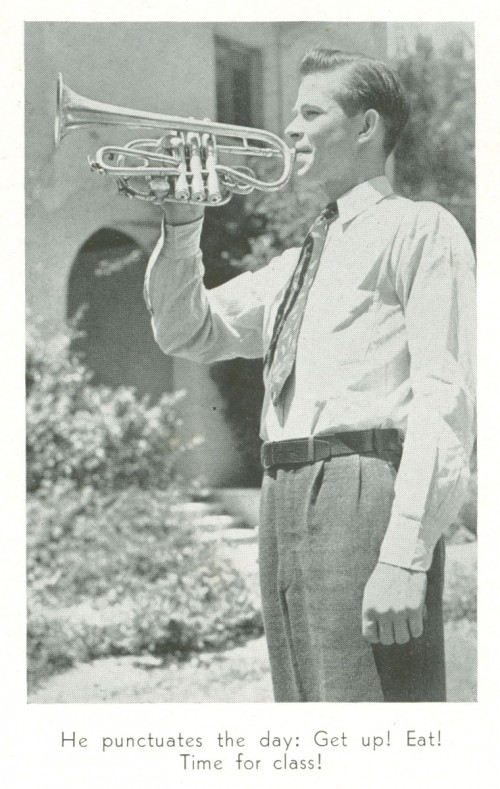The Bugler, pictured in the 1937 Tomokan yearbook
In April 1953, The Sandspur reported “a minor revolution” on campus: the era of the campus bugler had ended. He had been replaced by chimes, a gift of the graduating class of 1952.
Though we know when this tradition ended, its origins are unclear. In the College’s early years, the bell in the tower of Knowles Hall marked various activities throughout the day (from a 7:00 wake-up call to “lights out” at 11:00). After the building burned down in 1909, Prof. Thomas Baker reported that the bell was “greatly missed upon the campus and in all the region about the college, for it called pupils to recitations, to meals, to study, to recreation—indeed, it was a signal-call to almost everything of importance that occurred upon the campus” (Florida Times-Union, Dec. 23, 1909).
The date at which the bugle succeeded the tower bell is unknown. The earliest mention of the bugler found to date comes from the November 20, 1915, edition of The Sandspur. There an article reported that the bugle would awaken students at 7:30 on Thanksgiving Day “(Item, one extra hour of sleep; this is where our thanksgiving commences.)”
Over the years, various students were employed as campus bugler. As such, they were often the target of pranks played by their classmates. In 1928, The Sandspur asked, “Who took the bugle?” after it disappeared one afternoon. After three days, “the Dean found it impossible to endure more. He called four outstanding men from this college called Rollins in to talk to him.” After an ultimatum to return the bugle or buy a new one, “four stalwart fellows climbed up the chimney in Chase Hall” to retrieve it (The Sandspur, 4/27/1928). In 1949, The Sandspur asked,”Who stole Stanley Rudd’s bugle and twisted it until it was dead?” (2/3/1949). And bugler Paul Grannan often had to hear comments such as, “Hold it for a minute wouldja?” from students who were running late (The Sandspur, 12/7/1945).
Sometimes the bugler made national news. When freshman Presley Wetherell filled in during the illness of the regular bugler, he became the subject of an Associated Press article, “Rollins Bugler Tacks on Tunes.” The story noted that Wetherell added an extra flourish to his “fourteen daily calls, usually tacking on a finale, reaching anything from ‘Loch Lomond’ to ‘Minnie the Moocher’” (The New York Times, 1/27/1939). In the 1940s, a Saturday Evening Post article about Rollins described “one of the more arresting academic oddities on exhibition. There is, for example, a young man with a horn who operates approximately a hundred yards from Dr. Holt’s office. As a hot trumpet player, his function is to convene and dismiss classes with a few melodious blasts at the appointed hours. It is something of a jolt to see young people scurrying for the classrooms while this fellow stands under a central palm tree, spurring them on with a chorus of ‘Sweet Lorraine’” (The Saturday Evening Post, 2/23/1946).
 “Pres Relieves Felder,” from the 1939 Tomokan yearbook
“Pres Relieves Felder,” from the 1939 Tomokan yearbook
But a few years later, a Sandspur editorial, “Sick Ears Seek Peace” (1/17/1952), called for the bugle to be replaced by a more modern system. About a month later, the senior class voted to replace the bugler with chimes, as a gift to their alma mater. And the last bugle call was given by Dan Matthews ’55 the following spring.
 Dan Matthews plays the final bugle call at Rollins
Dan Matthews plays the final bugle call at Rollins
Mary Seymour ’80 provides a coda to this story: “Ironically, Matthews’ future wife, Deener Vigeant’52, was partially responsible for the demise of his job. The class of 1952—her class—donated the money for the new loudspeaker system. Matthews, recently retired rector of Trinity Church in New York City, still teases his wife about unseating him as resident Rollins bugler.”
~ by D. Moore, Archival Specialist

